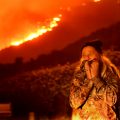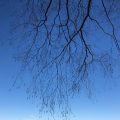
Blue Skies
In the mid-nineteen-nineties, I lived for a summer on Deer Isle, Maine. It was a pretty typical Maine summer. Foggy mornings gave way to blue skies, or to a day spent listening to the drip of rain in the firs and the hoot of the foghorn in the distance. One morning, however, in addition to the thick white haze hanging low over our house, I woke up to the smell of smoke. It seemed too soon for anyone to be out grilling, but July in Maine was the season of clam bakes and lobster festivals, barbecues, and pig roasts. If you were cooking clams or lobsters or pork for a crowd of people, it wasn’t impossible that you might have to start early.
When I did finally go outside, I realized that there was no barbecue. The smell of burning was too strong and seemed to be coming from everywhere all at once. The “fog” was strange as well. Even though the sun had come out, it wasn’t dispersing.
“Fires in Quebec,” a neighbor told me. He was an older man who had been living in the cottage up the road since he was a boy.
“Reminds me of the fires of ‘47,” he said. “The ones that destroyed Bar Harbor.”
I don’t remember how many days it stayed smoky. It certainly didn’t occur to any of us to stay inside or to wear a mask.
“We can see the smoke from the Quebec fires all the way down here!” I called my parents in Connecticut. I was excited. It was an exotic situation for me, a natural event greater than myself.
Twenty-nine years later, I am back in Connecticut, more than 500 miles from where the fires in Quebec are burning and 800 miles from the ones in Nova Scotia. The white haze is the same, but I don’t remember the sky being so leaden. The smell isn’t as strong, but the sense of doom is clear. I broke into our leftover pandemic masks yesterday and wore a KN95 to plant nasturtiums. Was one public health disaster rolling into the next?
Here in Connecticut, we are lucky. We generally don’t have to worry about damaging wildfires. Not so the Californians. Last year, when several fires were burning out of control there, my sister, who then lived outside San Francisco, sent me daily photos of gray skies and orange suns. Her pictures looked apocalyptic, like artifacts from a dying civilization. A few days ago, I took similar pictures on my way to work.
It has been noted that the air pollution levels we have been horrified by here on the East Coast are in fact “normal” for many cities around the world. The inhabitants of some cities in India and Pakistan, China and the Middle East live in a great brown cloud all their lives.
It was like that in plenty of American cities not that long ago.
My mother grew up in Pittsburgh in the 1920’s and 1930’s when the steel mills worked round the clock, spewing smoke into the air. Streetlights burned during the day and children went to school holding cloths over their mouths.
My mother married my father when she was 26 and came East, first to New York City, where the air quality wasn’t that great either, and then out to Long Island and up to Connecticut where it was better. In her later years, when she was suffering from Alzheimer’s, she used to tip back her head on fine days and marvel at the sky.
“Blue skies,” she would repeat more times than I care to remember. “Blue skies.”
At the time, I understood my mother’s repetitive observation purely as a symptom of her disease, but one day she explained herself.
“The skies weren’t blue when I was a child.”
It was the lack of air pollution she was marveling at, and perhaps also her ability to draw a fresh lungful of air.
The steel mills of Pittsburgh are gone now and the skies over that city have long ago cleared, but when my mother left in 1949, the skies were just as gray as they had been when she was born there in 1924. Her childhood was perpetually overcast, a day with blue skies a miracle.
Is that where we are going? To a time and a place when having blue skies and breathable air is as exotic as a day of smoke used to be? Millions of people are already in this place. It’s starting to look like millions more will be joining them.
I try not to be gloomy. As I write this, though the fires still burn to our north, the wind patterns have shifted, and the Connecticut skies are once again clear. The air feels cool and fresh and I can garden without a mask. We know that the fires will eventually be extinguished. We know that there will be a reprieve. But for how long? Where and when will the next fires start as the rains fail and the temperature of the planet rises? My mother grew up under gray skies but died under blue ones. Will it be the other way for me?





I didn’t know that about Pittsburg! But your story reminded me of the “pea-souper” days when, as a small child in England, the smog from coal fires was so great that you could barely see your own hands.. I actually enjoyed those quite rare days, when I had to more or less feel my way to school, fencepost by fencepost, with scary nothingness when crossing a road. The air must have been dangerous to breathe yet, although gas masks were relics of the war and we had one in the house, it didn’t occur to us to wear something to protect our lungs. Given climate change it seems inevitable that bad air quality will increasingly be part of ours and our children’s and our grandchildren’s lives.
I thought about the London fogs when I was writing this!
Those fogs were an important early sensory experience for me. I was reminded of them when John and I took our scuba diving exam and had to navigate our way from the dive boat anchored off the harbor in Bridgeport CT to a lighthouse over the bay. We had to walk on the ocean floor (Long Island Sound) through opaque water that you could barely see your hand in solely by reading the compass in our barely discernible diving watches. The water was churned up by recent rain, hence minimal visibility. We managed to navigate to the lighthouse and back to the dive boat accurately, which I put down to early experiences with English fogs. If I could find my way in those, then I would not be deterred by a murky Long Island Sound.
Yes, the “normal” Maine peasoupers could be beautiful. I especially liked the muted quality of the sounds.